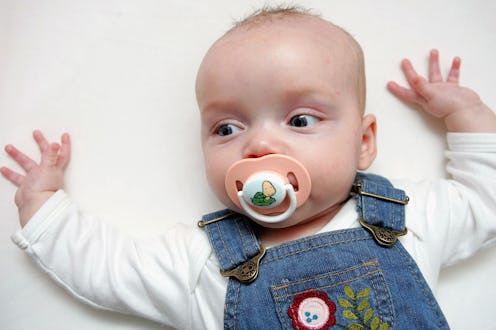Life
This Is The "Stress Cost" Of Having Kids
Just how stressful is it to become a parent, exactly? You don't need to have spawned a few kids already to realize that those sleepless nights, sick days, and frantic afternoons chasing the little tyke around the park trying to keep it from eating trash aren't always fun and easy. But if you're looking for more quantitative info, we've finally got one, thanks to economists Hielke Buddelmeyer, Daniel S. Hamermesh, and Mark Wooden, via Jezebel. They've crunched the numbers and figured out that, above and beyond the costs of materially caring for a kid, the "stress cost" of having a kid is huge. According to these guys, it would take $66,000 to compensate a mother just for the additional stress caused by one of her children. Yikes!
To come up with a general idea of the stressors of parenting, the economists used longitudinal studies of adults in Australia and Germany, which included more than 7,000 married couples who were tracked for about a decade. Judging from questions about how pressed the participants felt for time and how satisfied they were with their financial situations, it's pretty clear that parents are more stressed than non-parents, and that mothers in particular shoulder a longer-lasting stress burden upon the birth of a child than do the fathers, for whom the stress fades after a couple of years. And the amount of money necessary to compensate for the stress cost in terms of happiness is, then, fairly high.
Stats like this get tons of attention, for obvious reasons. Parents get to say that their subjective experiences of stress are real (and their complaints are justified). Non-parents get to say that parents are crazy for doing this. No one changes their mind about whether to actually have a kid or not, because the study doesn't measure the kind of happiness that hopeful parents have in mind — they are largely curious about having kids and want to raise them from start to finish, even if that does include a dirty diaper pail.
Notice the main limitation of this study, by the way — it compares very new parents to non-parents. Those new parents are, obviously, the parents of babies, and babies are extremely needy without providing much back in the way of success, achievement, or emotional engagement. It would be harder to compare the happiness of parents for the first 20 years of their children's lives to 20 years of happiness for comparable non-parents, but that would be more accurate. And since we know that money is often pretty ineffective at buying us happiness in general, of course the "stress cost" compensation number seems high.
Especially since people are living longer than ever before, it is reasonable to expect that you'll spend many more years engaging with your prospective children when they can talk, support themselves, and use the toilet than you will ever spend parenting babies, thank goodness. And if you've been a good parent, the satisfaction potential there is huge. We need a few more numbers for comparison too, like maybe the "stress cost" of realizing at age 40 that you do want to have a kid, but that you are going to have a hard time conceiving one.
Images: Giphy (2)
